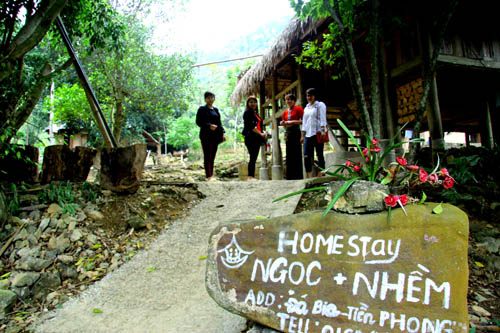
(HBO) – Magnificent mountains, primeval forests, numerous caves, magical waterfalls, and traditional cultural values of ethnic groups have all been used to boost tourism in the upland district of Da Bac.
Ke hamlet, Hien Luong commune, is next to Hoa Binh Lake, which boasts a poetic natural
landscape. In the rainy season, the water creates breathtaking waterfalls. The
hamlet has 85 Muong ethnic households. It is an interesting destination for
domestic and foreign tourists.
Homestay site at Da Bia
hamlet, Tien Phong commune (Da Bac) operating effectively
Dinh Quy Huu, from one of
the three families providing homestay services in Ke commune said foreign
visitors mainly come from France,
Sweden, Japan and the Republic of Korea,
while domestic tourists are mostly young people. Tourists want to learn about
local customs. Besides tasting traditional specialties such as "ga doi”
(chicken), "ca ho” (fish), "mang chua” (sour bamboo shoots), "ruou can” and
"ruou hoang” (wine), visitors can join farming activities, as well as cook
rice, fish, dance, cycle around the hamlet, swim, and stroll. Visitors love
walking from Ke hamlet to Ngu and Mai hamlets in Hien Luong commune, crossing
Bieu mountain to Sung hamlet in Cao Son commune – where the Dao ethnic minority
people live. These tourism activities have helped residents increase their
income and have improved their awareness of preserving culture and protecting
the environment.
Head of the culture and
sport division Nguyen Van Hien said Da Bac district has welcomed many foreign
tourists to learn about lives of local people. The Australian Foundation for
the Peoples of Asia and the Pacific (AFAP) has boosted Da Bac tourism. The
foundation supported and trained some households in homestay tourism at Ke and
Da Bia hamlets. The district’s People’s Committee has implemented policies to
support the development of community-based tourism. The district has developed
more than 10 households to provide community tourism. The AFAP also plans to
assist two families in Sung hamlet in Cao Son commune to upgrade their houses,
clean the environment, and provide community tourism services. The foundation
has also worked with one Asian travel company to bring four delegations of
tourists to Sung hamlet in July. It plans to invite 2,000-2,500 foreign
visitors annually to learn about the Dao ethnic people in Cao Son commune. Da
Bac district is building a resolution on tourism development through 2030 as
part of Hoa Binh Lake
being developed into a national tourist site. The district will also take
advantage of assistance from the province and organisations to step up
popularisation of tourism potential, and implement policies to help businesses
to develop tourism, especially eco-tourism, resort tourism, and discovery
tourism. A positive sign is that many enterprises have conducted surveys to
build tourism products./.
By Lê Chung
Located just a 20-minute drive from Hoa Binh City, Ora Hill Farmstay & Glamping Hoa Binh is a captivating new destination nestled in Mo hamlet, Bình Thanh commune, Cao Phong district. Combining farming with leisure, this tranquil retreat is perfect for those seeking balance, joy, and an immersive experience in the expansive beauty of nature.
Muong Bi - Tan Lac is renowned as one of the four famous Muong regions in Hoa Binh province. Blessed by nature with a favourable climate and stunning landscapes, Tan Lac holds great advantages for tourism development. The local tourism industry has made remarkable strides in recent times thanks to the attention and support from the local authorities and sectors.
With its strategic location, well-developed transport network, and diverse soil and climatic conditions, Hoa Binh is emerging as a must-visit destination in Vietnam's northwestern tourism corridor. The province boasts numerous attractions, including the Kim Boi hot springs (Kim Boi district), the Dau Rong cave complex (Cao Phong), the Mai Chau valley (Mai Chau), and the iconic Hoa Binh hydropower plant.
The northern mountainous province of Hoa Binh has been listed among the 71 most beautiful places to visit worldwide by the prestigious US travel magazine Condé Nast Traveller.
Hoa Binh province’s rich natural and cultural resources position it as a prime location for developing community-based tourism (CBT). In recent years, support from central and provincial policies, as well as assistance from non-governmental organisations, have encouraged local ethnic minority and mountainous communities to actively engage in the sector.



